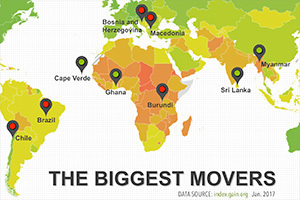The latest data released by the Notre Dame Global Adaptation Initiative (ND-GAIN) shows governance is a major factor for countries improving preparedness for climate change. The annual ND-GAIN Country Index ranks 181 countries on vulnerability to extreme climate events such as droughts, superstorms and other natural disasters as well as readiness to successfully implement adaptation solutions.
The top five countries showing the biggest amount of improvement in preparedness over the last year were Ghana, Solomon Islands, Cape Verde, Sri Lanka and Myanmar. Countries showing the least amount of improvement included Bosnia and Herzegovina, Chile, Macedonia, Burundi and Brazil – host to the 2016 Summer Olympic Games.
ND-GAIN researchers measure common factors of successful adaptability to climate change, such as improved economies, access to resources including reliable drinking water, agricultural capacity and political stability.
“Political changes bring opportunities for countries to improve on the overall stability of the country with regard to climate issues,” said Patrick Regan, associate director of Environmental Change Initiative for ND-GAIN and professor of political science at the University of Notre Dame. “At a time when adaptation to climate change is critical, this data shows that policy makers are a key component to ensuring countries large and small are prepared to face potentially devastating natural disasters.”
The findings will be shared at the United Nations World Data Forum in Cape Town, South Africa, Jan. 15-18.
More About ND-GAIN’s Biggest Movers:
- Myanmar tops the list of those countries making improvements. The country saw sweeping political changes following decades of military rule and experienced constitutional reforms, elections and elimination of economic sanctions, and it expanded its information and communication technology infrastructure.
- In Sri Lanka, progress has been steadily improving since violent conflict ended in 2009. Recent elections ended political corruption and, subsequently, reforms have helped improve the country’s readiness score substantially.
- Burundi saw the least amount of progress – making it the biggest degrader in 2015. The country has suffered civil unrest and a coup was announced in May 2015, making Burundi one of the most politically unstable countries in that year.
The index also measures those countries improving or degrading over a five-year period. Countries making significant improvements over a five-year period include Russia, Uzbekistan, Iran and Rwanda. Those countries whose score slipped during the same period include Syria, Cuba, Spain and Argentina.
ND-GAIN’s full country ranking as well as country profiles and visualization tools are available at index.gain.org. A webinar that discusses ND-GAIN’s new data is also available here.
The ND-GAIN Country Index aims to unlock global adaptation solutions that save lives and improve livelihoods while strengthening market positions in the private sector and policy decisions in the public sector. Measuring not only vulnerability but also the readiness to take on investment, it informs strategic, operational and reputational decisions regarding supply chains, capital projects and community engagements. The index includes 21 years of data across 45 indicators for 181 countries. ND-GAIN is housed in the Environmental Change Initiative of the University of Notre Dame.
Contact: Alex Gumm, 574.807.9322, agumm@nd.edu
Originally published by at news.nd.edu on January 11, 2017.
